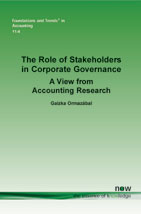The Role of Stakeholders in Corporate Governance: A View from Accounting Research
Gaizka Ormazábal, IESE Business School & C.E.P.R., Barcelona, Spain, gormazabal@iese.eduAbstract
I review the empirical research on the role of stakeholders in corporate governance with an emphasis in contributions from the accounting literature. In particular, I focus on the following stakeholders: employees, the general public, the media, related firms, the government, private regulators, gatekeepers, and foreigners. This list does not include capital providers (shareholders and debt-holders), as the governance role of these stakeholders has already been covered by prior surveys in the academic literature. The discussion is structured around each stakeholder's incentives to influence managerial behavior, the mechanisms through which stakeholders act on managerial actions, as well as any concerns about this influence. All the analyzed stakeholders appear capable of influencing managerial actions to some extent, but the efficacy of stakeholders' monitoring role is controversial. Empirical research uncovers several factors that undermine stakeholders' incentives to discipline corporate managers. And more critically, in some cases stakeholders' incentives appear to be misaligned not only with shareholders' interests but also with the public interest. Taken together, the reviewed evidence suggests that the monitoring role involves a wide range of actors beyond the board of directors and capital providers. The review also points out that there is still much to learn about stakeholder monitoring.
The Role of Stakeholders in Corporate Governance: A View from Accounting Research
The Role of Stakeholders in Corporate Governance: A View from Accounting Research reviews the empirical evidence on stakeholders' influence on managerial behavior focusing on stakeholders — employees, the general public, the media, related firms, the government, private regulators, gatekeepers, and foreigners — rather than shareholders and debt-holders. In analyzing the role of stakeholders in corporate governance, the focus is on their ability and incentives to discipline corporate managers. The question addressed is whether under the current institutional design, stakeholders can help reduce managerial behavior that is socially undesirable.
For each stakeholder, the review analyzes the economic forces that determine how and to which extent the stakeholder contributes to discipline managerial behavior. The author first discusses the incentives of each stakeholder to influence managerial actions. Second, the author describes the mechanisms through which stakeholders influence managerial actions, and third, the author identifies the frictions that potentially prevent stakeholders from disciplining managerial behavior.
In addition to more specific conclusions, the following broad points emerge. First, all the analyzed stakeholders appear to influence managerial actions to some extent, suggesting that corporate governance should consider the monitoring roles of many actors and implies that stakeholder monitoring could substitute for costly corporate governance mechanisms. Second, the efficacy of the stakeholders' monitoring role is not clear-cut calling for further research.
